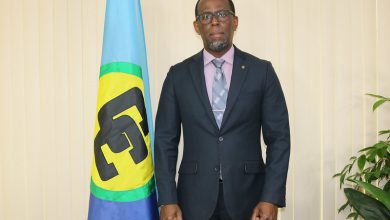CHRIST CHURCH, BARBADOS – The G-20 – which was formed ahead of and rose to prominence at the ill-fated Fifth World Trade Organization (WTO) Ministerial Conference, this past September – met in Brasilia, Brazil, December 11 to 12. The meeting was convened ahead of a high-level WTO General Council meeting, set for December 15. The meeting took place at Ministerial level. It was intended as an interchange and coordinative session focused on how to advance multilateral agricultural negotiations and, allied to this, attaining progress in the stalled Doha Round. The G-20 meeting has been hailed as ‘constructive’. CARICOM was invited to participate, and attended the meeting as an observer. Its delegation was headed by the Director-General of the Caribbean Regional Negotiating Machinery (RNM), Ambassador Dr. Richard Bernal. He was accompanied by Dr. Peter Gonzales, RNM Director of WTO Matters. Ambassador Bernal emphasized that “CARICOM was in attendance for four reasons: (i) the region is committed to the resumption of negotiations on the Doha Agenda and the G-20 has an important role to play in this process; (ii) Agricultural trade reform is the centre-piece of global trade talks. Agriculture is a fundamental plank of the G-20’s trade interests, and is important to CARICOM. This common ground lent itself to our involvement in the G-20 forum; (iii) the G-20 has played an important role in opening up negotiating space for developing countries, the region wanted to show its solidarity in this regard; and, (iv) CARICOM views its participation in the meeting as part of its wider strategic alliance with developing countries, critical especially since small developing countries lack negotiating leverage. Fostering a relationship with the G-20 is important to the region”. The invitation extended to CARICOM to participate in the key meeting represented the G-20’s efforts to broaden its outreach activities. The Group has been keen to involve various developing countries in its initiatives. The expectation is this dialogue will enable a comprehensive alliance to be built on. The Group is expected to continue its outreach activities next year. The G-20 is examining its long-term existence, and to this end the G-20 meeting represented an effort aimed at pursuing initiatives to sustain and formalize the Group. Tanzania and Zambia are the most recent countries to join; Ecuador is a possible candidate for accession. More recently, the G-20 has made overtures toward countries of the Africa Caribbean Pacific (ACP) Group, and Least Developed Countries (many of which are also email: nand.bardouille@crnm.org members of the ACP) in order to build on the inclusiveness of the Group. What has been described as a ‘positive’ meeting with the EU took place on the occasion of the Group’s meeting. The EU Trade Commissioner engaged in an exchange of views with G-20 Ministers. The interface revealed “there was general agreement that we need to intensify negotiations early next year and to move as quickly as possible into an increased dialogue between all partners to achieve real and substantive progress in line with the Doha mandate and within the timeframe defined therein”. The RNM chief has characterized CARICOM’s invitation to the G-20 meeting as a watershed. “It is unprecedented”, he said. “Our participation was a success. We benefited from the insight from a broad spectrum of countries; it provided a clearer understanding of the positions of other WTO member governments and prospects for resuming Doha Agenda negotiations. It also provided an opportunity for CARICOM to exchange views on the Free Trade Area of the Americas (FTAA) theatre, with certain countries”. The G-20 meeting is being viewed as an important opportunity to give impetus to stalled global trade talks, in advance of the mid-December WTO General Council meeting. It is, however, also being perceived as part of another track of solidarity amongst member countries. Brazilian President Luiz Inacio Lula da Silva used the occasion of the closing of the G-20 meeting to call for the establishment of a free trade area among G-20 members; “I think we can be bolder among developing countries and think about the launch of a free trade area,” Lula remarked. G-20 officials announced that there was a possibility their next meeting could be held on the occasion of the United Nations Conference on Trade and Development (UNCTAD) XI Conference in Sao Paulo, Brazil in June 2004 or at an earlier date, should progress in the negotiations so warrant. In addition to the host country, delegations from the following countries attended the meeting inter alia: Argentina, Bolivia, Chile, China, Cuba, Egypt, India, Indonesia, Mexico, Nigeria, Pakistan, Paraguay, Philippines, South Africa, Tanzania, Venezuela and Zimbabwe. A representative from Ecuador attended. CARICOM was also represented at the meeting. WTO Director-General, Supachai Panitchpakdi, and European Union (EU) Trade Commissioner, Pascal Lamy, met with G-20 Ministers, as special guests. ——————————————————————— For More Information Contact: Nand C. Bardouille Tel: (246) 430-1678
BarbadosCARICOMPress ReleasesTradeWorld Trade Organisation






